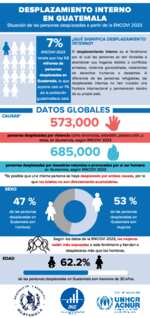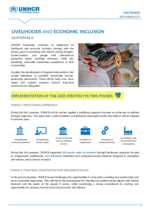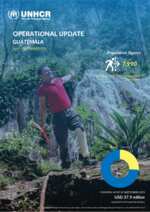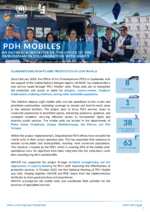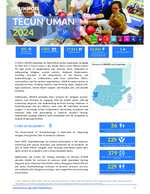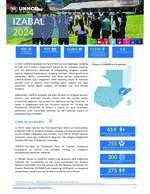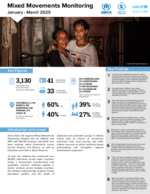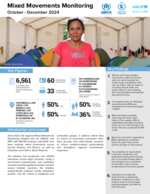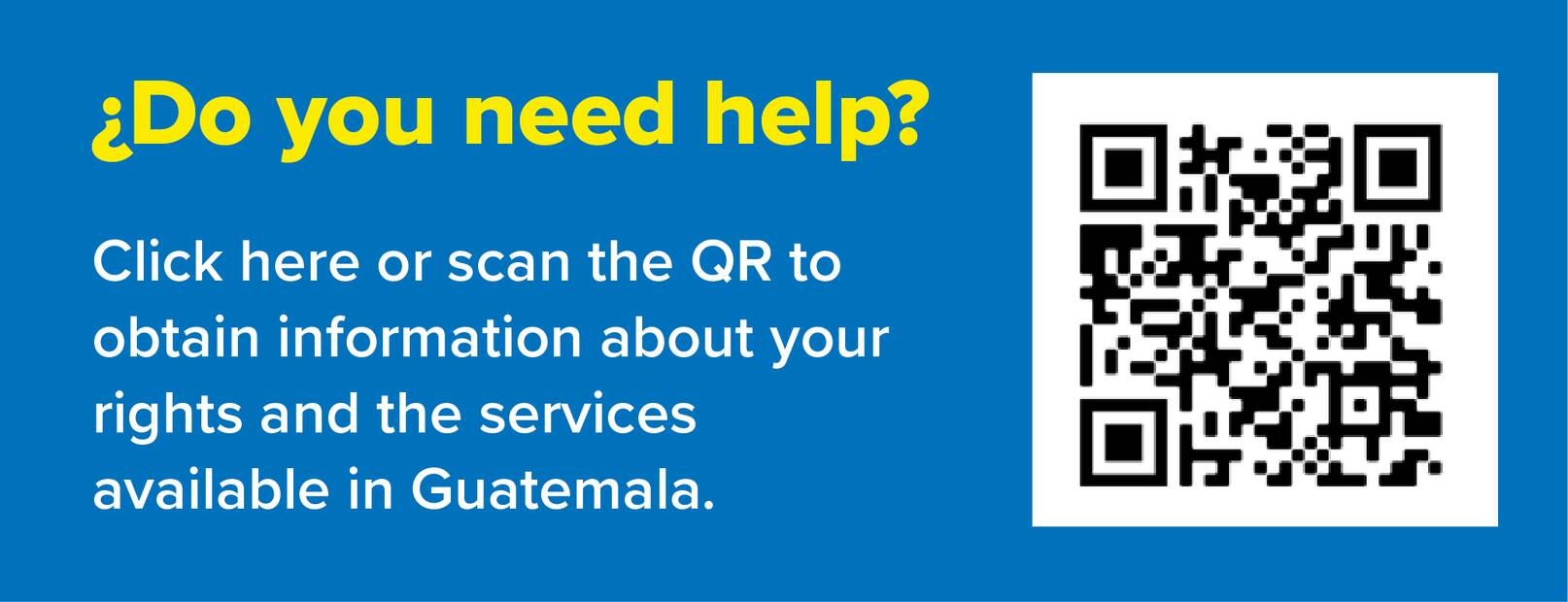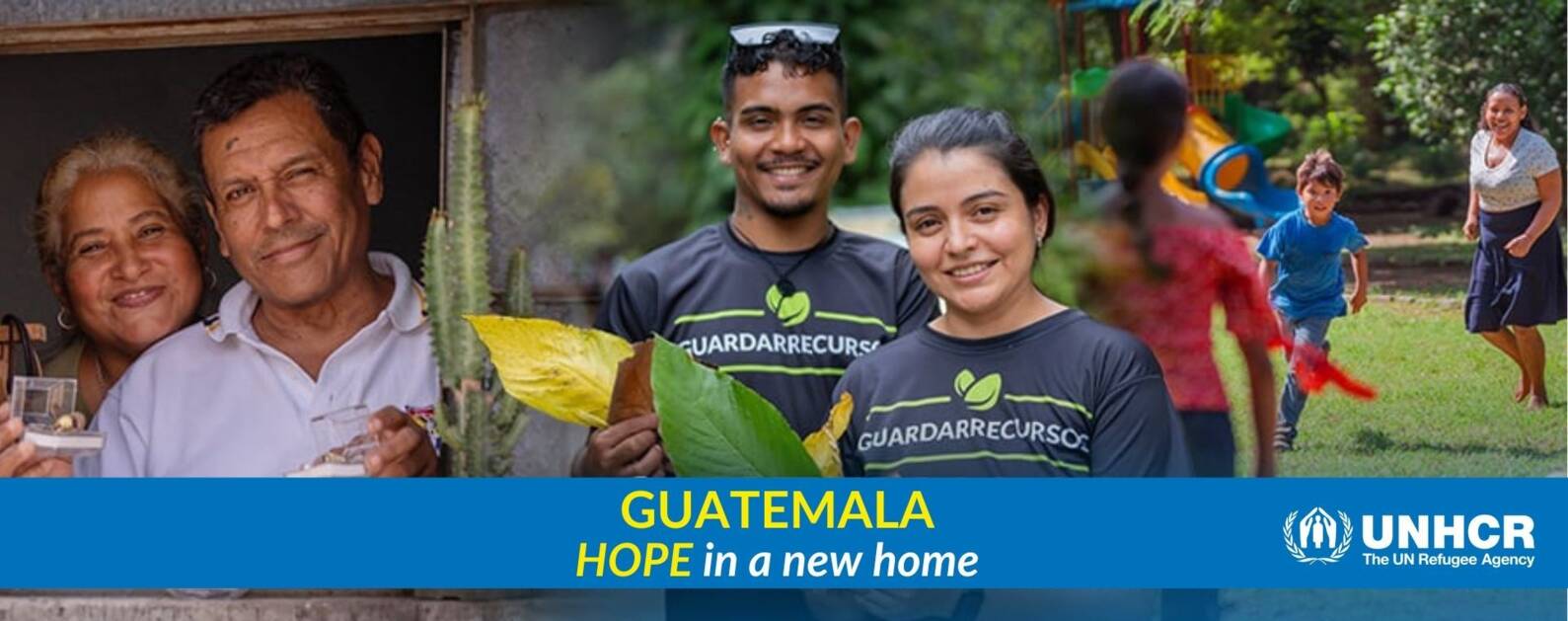
Guatemala’s strategic location places it at the center of regional migration dynamics. The country serves simultaneously as a point of origin, transit, destination, and return, creating complex challenges and opportunities for national systems and humanitarian actors. In recent years, Guatemala has emerged as a key destination for asylum-seekers, particularly from Honduras, El Salvador, Venezuela, and Nicaragua, with applications steadily increasing. These overlapping roles demand coordinated efforts to strengthen protection mechanisms, expand access to services, and promote durable solutions that allow refugees, asylum-seekers, returnees, internally displaced persons (IDPs), stateless individuals, and others with international protection needs to fully integrate and enjoy equal access to rights, services, and opportunities.
To achieve this vision, UNHCR supports the strengthening of legal and institutional frameworks, asylum procedures, and carries out advocacy to ensure effective access to legal assistance and protection services for the most vulnerable groups. It also promotes economic empowerment by increasing access to livelihoods, vocational training, and financial services, and by forging strategic partnerships with the private sector, development institutions, and other key actors. These efforts enable displaced populations to contribute to and benefit from Guatemala’s economy.
Guatemala advanced regional commitments through MIRPS, the Quito Process, and pledges at the Global Refugee Forum. UNHCR complements these efforts by building institutional capacity and promoting durable solutions that uphold dignity, rights, and resilience for all.
| Country of origin | Source | Data date | Population | |
|---|---|---|---|---|
| El Salvador | Government | 30 Sep 2025 | 37.7% | 646 |
| Honduras | Government | 30 Sep 2025 | 24.2% | 415 |
| Nicaragua | Government | 30 Sep 2025 | 16.8% | 288 |
| Venezuela (Bolivarian Republic of) | Government | 30 Sep 2025 | 11.4% | 195 |
| Mexico | Government | 30 Sep 2025 | 3.3% | 57 |
| Others | Government | 30 Sep 2025 | 2.8% | 48 |
| Cuba | Government | 30 Sep 2025 | 2.7% | 46 |
| Colombia | Government | 30 Sep 2025 | 1.1% | 18 |
| Country of origin | Source | Data date | Population | |
|---|---|---|---|---|
| Honduras | Government | 30 Sep 2025 | 29.9% | 1,878 |
| El Salvador | Government | 30 Sep 2025 | 19.2% | 1,208 |
| Venezuela (Bolivarian Republic of) | Government | 30 Sep 2025 | 19.1% | 1,202 |
| Nicaragua | Government | 30 Sep 2025 | 17.7% | 1,108 |
| Colombia | Government | 30 Sep 2025 | 4.0% | 250 |
| Cuba | Government | 30 Sep 2025 | 3.5% | 219 |
| Mexico | Government | 30 Sep 2025 | 2.3% | 147 |
| Others | Government | 30 Sep 2025 | 2.2% | 139 |
| Peru | Government | 30 Sep 2025 | 0.7% | 46 |
| Ecuador | Government | 30 Sep 2025 | 0.7% | 45 |
| Cameroon | Government | 30 Sep 2025 | 0.3% | 20 |
| United States of America | Government | 30 Sep 2025 | 0.2% | 15 |
Desplazamiento Interno en Guatemala - Infografias
DocumentCreate date: 30 October 2025 (4 months ago)
Livelihoods and Economic Inclusion - Guatemala
DocumentCreate date: 30 October 2025 (4 months ago)
Operational Update - Guatemala | July-September 2025
DocumentCreate date: 30 October 2025 (4 months ago)
PDH Mobiles | An outreach initiative of the Office of the Ombudsman in collaboration with UNHCR
DocumentCreate date: 4 July 2025 (7 months ago)
Livelihoods and Economic Inclusion - Guatemala
DocumentCreate date: 30 October 2025 (4 months ago)
PDH Mobiles | An outreach initiative of the Office of the Ombudsman in collaboration with UNHCR
DocumentCreate date: 4 July 2025 (7 months ago)
Field Unit Tecun Uman - Guatemala
DocumentCreate date: 21 June 2025 (8 months ago)
Field Unit Izabal - Guatemala
DocumentCreate date: 21 June 2025 (8 months ago)
Desplazamiento Interno en Guatemala - Infografias
DocumentCreate date: 30 October 2025 (4 months ago)
Guía de Inclusión Laboral | POBLACIÓN CON DISCAPACIDAD
DocumentCreate date: 19 December 2024 (1 year ago)
Guía de Inclusión Laboral | CON ENFOQUE DE GÉNERO
DocumentCreate date: 19 December 2024 (1 year ago)
Guía de Inclusión Laboral | POBLACIÓN EN SITUACIÓN DE MOVILIDAD HUMANA
DocumentCreate date: 19 December 2024 (1 year ago)
Guía de Inclusión Laboral | CON ENFOQUE EN GRUPOS DIVERSOS (jóvenes, personas mayores, población étnica)
DocumentCreate date: 19 December 2024 (1 year ago)
The Americas - UNHCR's total resettlement capacity for 2017 by country of asylum - 25 May 2016
DocumentCreate date: 23 January 2017 (9 years ago)
Honduras, Guatemala and Mexico - Americas Migrant Caravan Situation - as of 31 October 2018
DocumentCreate date: 5 December 2018 (7 years ago)
Guatemala Atlas Map
DocumentCreate date: 3 March 2011 (14 years ago)
Northern Triangle of Central America - UNHCR Presence- 2016 Solutions and Protection Strategy - 15 December 2015
DocumentCreate date: 17 January 2017 (9 years ago)
Overview of internal displacement in Honduras
DocumentCreate date: 11 August 2017 (8 years ago)
R4V Launches “One Step Closer,” A Campaign in Solidarity with Refugees and Migrants in Latin America and the Caribbean – August 2020 [EN]
DocumentCreate date: 24 August 2020 (5 years ago)
“Acortemos distancias”, nueva campaña de solidaridad con las personas refugiadas y migrantes en América Latina y el Caribe – Agosto 2020 [ES...
DocumentCreate date: 24 August 2020 (5 years ago)
Mixed Movements Monitoring Report I UNHCR-WFP-UNICEF | Q1 2025
DocumentCreate date: 13 June 2025 (8 months ago)
Mixed Movement Monitoring Report | UNHCR-WFP-UNICEF | Q4 2024
DocumentCreate date: 13 June 2025 (8 months ago)
Mixed Movements Monitoring Report | UNHCR-WFP-UNICEF | Q3 2024
DocumentCreate date: 19 December 2024 (1 year ago)
POST-DISTRIBUTION MONITORING REPORT | Guatemala
DocumentCreate date: 19 December 2024 (1 year ago)
Mixed Movements Monitoring Report I UNHCR-WFP-UNICEF | Q1 2025
DocumentCreate date: 13 June 2025 (8 months ago)
Mixed Movement Monitoring Report | UNHCR-WFP-UNICEF | Q4 2024
DocumentCreate date: 13 June 2025 (8 months ago)
Mixed Movements Monitoring Report | UNHCR-WFP-UNICEF | Q3 2024
DocumentCreate date: 19 December 2024 (1 year ago)
Mixed Movements Monitoring Report | UNHCR-WFP-UNICEF | Q2 2024
DocumentCreate date: 27 September 2024 (1 year ago)
Guatemala: Boletin - Julio 2022
DocumentCreate date: 13 July 2022 (3 years ago)
UNHCR Guatemala - Operational Update (Jan-Apr 2023)
DocumentCreate date: 8 June 2023 (2 years ago)
ACNUR Guatemala - Actualización Operativa (En-Abr 2023)
DocumentCreate date: 8 June 2023 (2 years ago)
Guatemala: Newsletter - July 2022
DocumentCreate date: 13 July 2022 (3 years ago)
Operational Update - Guatemala | July-September 2025
DocumentCreate date: 30 October 2025 (4 months ago)
Guatemala: Newsletter - June 2022
DocumentCreate date: 15 June 2022 (3 years ago)
Guatemala: Boletín - Junio 2022
DocumentCreate date: 15 June 2022 (3 years ago)
Guatemala: Newsletter - May 2022
DocumentCreate date: 31 May 2022 (3 years ago)
Guatemala: Actualización Protección Comunitaria - septiembre 2024
DocumentCreate date: 4 November 2024 (1 year ago)
Guate's Wrap-up! | The UNHCR Newsletter from Guatemala
DocumentCreate date: 29 October 2024 (1 year ago)
Guatemala: Actualización Protección Comunitaria - junio 2024
DocumentCreate date: 31 July 2024 (1 year ago)
Guatemala: Boletin - Julio 2022
DocumentCreate date: 13 July 2022 (3 years ago)
-
Guatemala - Central America & Mexico
Forced displacement continues to grow in numbers, and in complexity. Gang violence, persecution and human rights violations have left no other choice for around 720,000 people from the North of Central America but to flee either internally or across borders. The social and political crisis in Nicaragua since April 2018 has forced over 100,000 nationals to neighboring countries. UNHCR has expanded its presence and operational capacity in recent years to strengthen protection alternatives and facilitate solutions for those affected.
-
Guatemala - Regional Bureau for the Americas
UNHCR’s Regional Bureau for the Americas oversees operations in the Americas and the Caribbean, one of the world’s most dynamic and complex displacement situation. By the end of 2024, it hosted 21.9 million forcibly displaced persons and others in need of protection – accounting for one out of every six displaced or stateless person globally. This includes refugees, asylum-seekers, internally displaced persons, stateless individuals, and others affected by violence, persecution, organized crime, and increasingly, climate-related disasters. Displacement patterns are evolving, with declining northbound mixed movements and new southbound routes. Protection risks remain high, while insecurity and funding shortfalls continue to constrain humanitarian access. Internal displacement continues in Colombia, Haiti, and parts of Central America and Mexico, and asylum seekers continue to seek protection in Mexico, Brazil, and Costa Rica. Millions of Venezuelans refugees and migrants remain in Colombia, Peru, Chile, Brazil, Ecuador and other countries. Despite the challenges, the region offers opportunities. The integration of refugees drives socioeconomic gains for the region, and governments are advancing asylum systems, regularization pathways and legal stay arrangements. Initiatives promoting socioeconomic inclusion and naturalization, reinforced by regional frameworks like the Quito Process, MIRPS, and the Cartagena+40 Chile Plan of Action, demonstrate the region’s political will and commitment to solidarity and responsibility-sharing.
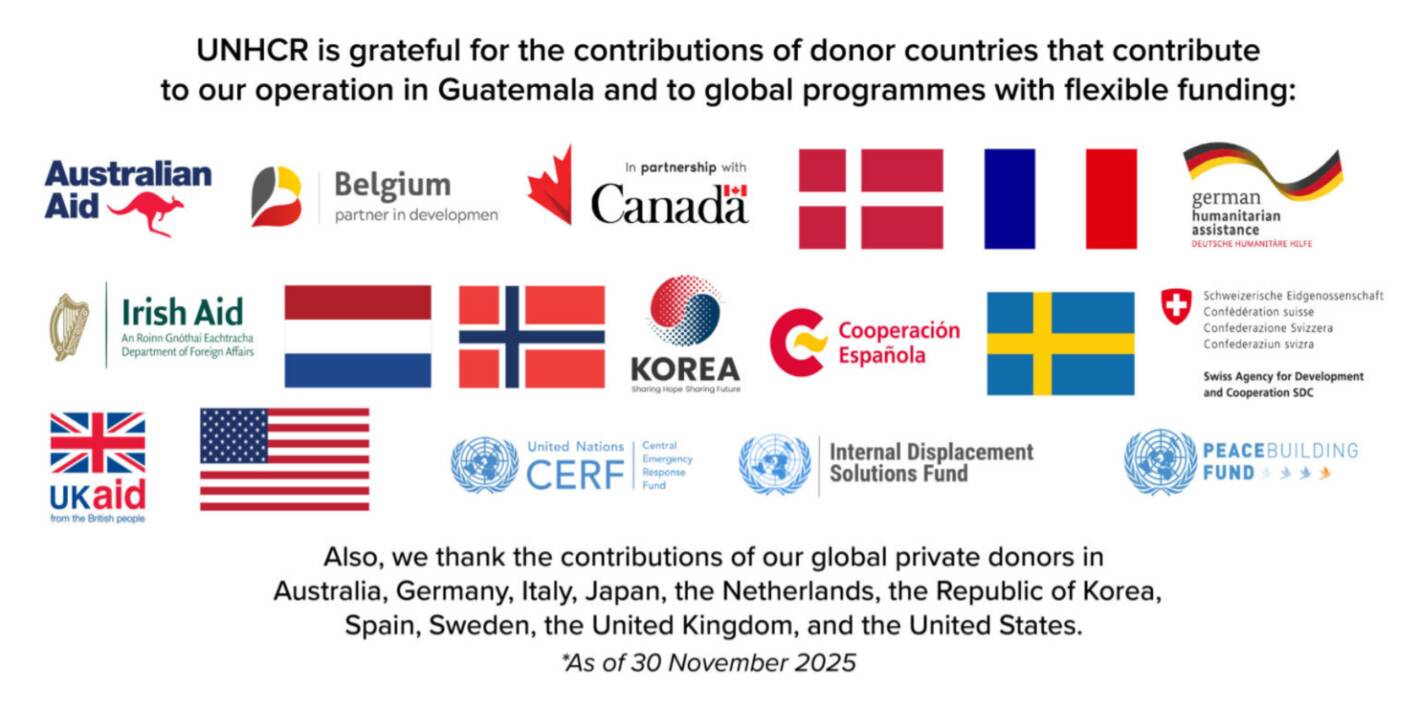
| Date of Funding Data | 30 September 2025 (5 months ago) |
For more information, please contact the following focal points
| External Relations & Reporting Unit | Jennifer HAMM hammlou@unhcr.org |
| Information Management Unit | Benjamin DOMINGUEZ domnguez@unhcr.org |
